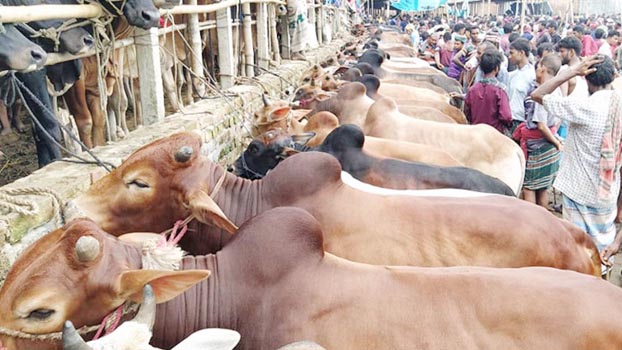No shortage of sacrificial animals
Over 1.19 crore animals available for sacrifice this Eid, cattle rearers fear low price

The country will not face any shortage of sacrificial animals during the upcoming Eid-ul-Azha as the supply of locally-reared cattle is quite enough to meet the demand, Ministry of Fisheries and Livestock officials say, adding over 1 crore and 19 lakh animals are ready to be sacrificed this time.
According to the Department of Livestock, country's farmers have about 1 million more animals than the demand.
Fisheries and Livestock Minister SM Rezaul Karim said,“The country has adequate supply of sacrificial animals this year. Now we are trying to shift our focus to online cattle markets because of coronavirus.”
He added,“Necessary steps would be taken to protect the environment by allowing only healthy cattle in the markets. In order to abide by the hygiene rules in the cattle market, all concerned will have to be careful and work with their own sense of responsibility and ethics. In this regard, those involved in the production and supply of livestock have to fulfill their due responsibilities.”
He further informed that about 1200 medical teams will be working in the cattle markets to prevent sick cattle from entering the market. At the same time, a monitoring team consisting of officials of the ministry will be formed. Measures will be taken as well to promote hygiene in the cattle markets.
However, cattle rearers and traders have voiced concerns over the price of sacrificial animals owing to the stalemate situation created by coronavirus.
According to the Bangladesh Dairy Farmers’ Association (BDFA), more than half of the cattle that get sold in the country throughout the year are actually sold during Eid-ul-Azha.
Shah Imran, general secretary of BDFA, said, “Many educated young people have set up cattle farms. Ordinary farmers have also increased rearing of cows and goats in the hope of good profits. But the problem is that the number of buyers and sellers in the cattle markets may see a downward trend owing to coronavirus pandemic.”
Shah Imran has also predicted that the number of animals to be sacrificedthis Eidwill be 20 percent less than other timesbecause of the health risks posed by coronavirus.




